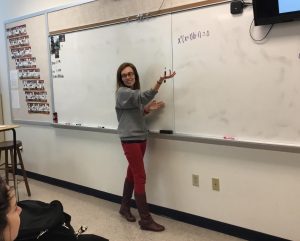A Guide for Success in Every SDHS Class
A universal struggle among students is preparing for tests. It seems like no matter how much time gets put into studying, there is always information to cram in at the last second. But what if you could eliminate the mad scramble to memorize a thousand terms the night before a test and actually learn the information in advance?
The approach to studying for each class will be a little different depending on each teaching style. For example, Dr. Daniel Matusiak’s Anatomy and Physiology classes involve lots of reading and memorization, while Mr. Justin Margadonna’s literature classes are mainly discussions and writing about real-world connections. Every class requires you to commit information to memory, whether it’s the chapter you read from Frankenstein or a section out of a Chemistry textbook. As daunting as these tasks feel, the St. Dominic teachers would never let you hang out to dry.
Dr. Amanda Drachnik teaches Chemistry here at St. Dominic and uses the flipped classroom technique in her lab-based classes. Dr. Drachnik’s classes involve a lot of reading beforehand like almost all of the science classes here, and she has some helpful tricks for retaining the information.
“I always suggest reading ahead before the teacher goes over it and at least trying to pick up some of the things that you read about… especially on the big ideas… When you go to class, take notes on what the teacher says and you can kind of go back and forth between the notes you took and what the teacher is saying… For a math and science class, go over problems. If the teacher just gives you one problem and you just didn’t get it when you go over it, try another problem with different numbers to make sure you internalize what you need to learn,” said Dr. Drachnik.
Dr. Matusiak’s classes work very similar to Dr. Drachnik’s. Students are consistently tasked with memorizing many diagrams and intricate terms. The work can feel overwhelming, but there are surefire ways to keep your head above the water.
“You have to stay current with it every day, because you can’t fall behind. They have to find different resources to help retain the information so that they look at it, they go over it, they go over it, they go over it. There is a physiological reason for that, in terms of the neural connections in the brain and the information. Some people are gifted and can see something or read something and pick it up right away. Most students, myself included… have to look at it and read through it and make it stay with them. Otherwise, it doesn’t go into what we call long term memory,”  said Dr. Matusiak.
said Dr. Matusiak.
Dr. Matusiak’s advice should be applied to any and every class. However, literature classes are a different ball game. Students must read and comprehend the material in order to have a full-grasp on the text. Mr. Margadonna has his own set of criteria he believes every student should follow in order to grow in their writing.
“I expect them really to think independently and just to be aware. Come to class with an open mind. Be ready to think… [and] be willing to accept criticism,” said Mr. Margadonna.
On the opposite end of the spectrum are math classes. A common problem among students is applying the classroom lessons to homework problems and tests down the road. As a math major in college, Ms. Moutray has lived through these same hardships and worked out methods to combat every ounce of confusion.
“Repetitive practice really helps, because once you start to understand the process you could be months down the road and remember when you did this kind of problem and the steps and then say these are the steps. Studying notes for a few minutes every day also really helps,” said Ms. Moutray.
Repetition has been a common theme in the advice from some of our St. Dominic teachers so far, but Mr. Nathan Doerr has a different stand when it comes to lecture style classes.
“I think you have to study and be engaged in class. You have to annotate notes you read, but you also have to raise your hand and respond. I think you learn by discussing and talking, not just reading. So, the more senses you use, the more you are going to retain it,” said Mr. Doerr.
This advice applies to just about every style class, from World History to Psychology. The bottom line is that effort is required to learn. The test category in Netclassroom can make up to anywhere from 30 to 70 percent of your grade, so it is important to do your absolute best when preparing.
It may feel like a chore to sit down and study information in advance, but it could make the difference between passing and failing at the end of the semester. The teachers at St. Dominic are here to help you excel in life and are the best available resources. Utilize the time during empower hour and do yourself a favor by trying out some of these grade-saving techniques.

Sydney Hofstetter is a senior at St. Dominic High School. She is involved in CRU, Pro-life Club and is the treasurer of French Club. She is always out...


